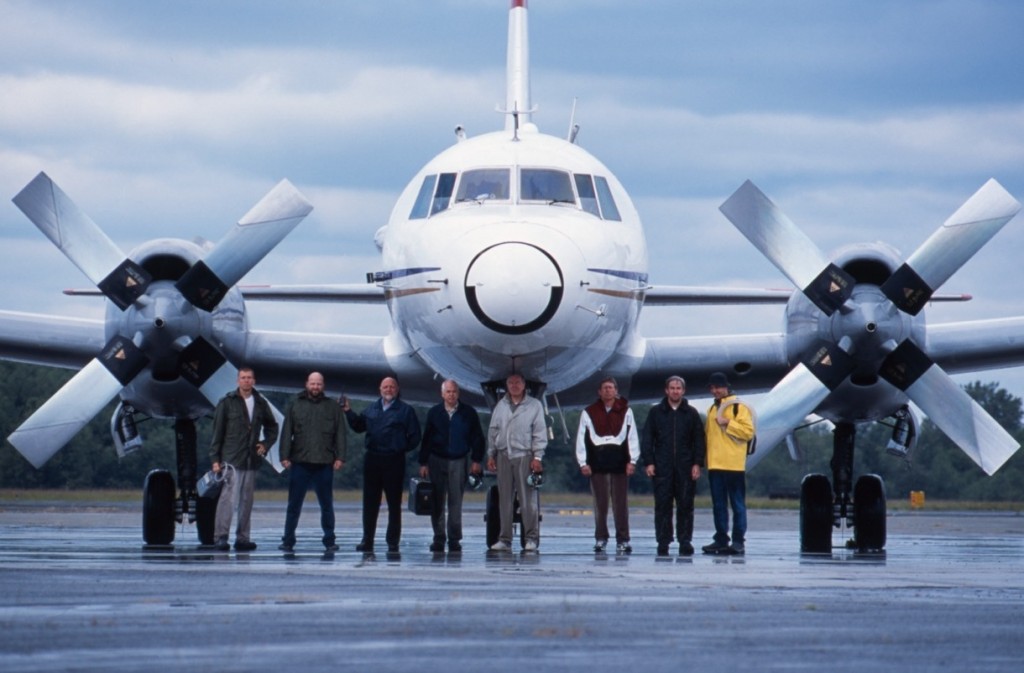INTERESTED IN RESEARCH? Email me, or read on, or both.

Dr. Magi in the yellow getting ready for graduate work (circa 2004). You will not be working on this aircraft since my work is mostly in the virtual world or on the ground now.
Application
Prospective students can apply to the undergraduate, Masters in Earth Sciences program, Geography PhD program, or INES PhD program in the Department of Earth, Environmental, and Geographical Sciences at UNC Charlotte. Graduate school applications can be submitted at the UNC Charlotte Grad School website.
Preparation
For prospective graduate students, you and I will get along if you are interested in studying the environment and the human-environment balance. For preparation, I look for students with a Bachelor of Science degree from programs ranging across Environmental Science, Physics, Chemistry, Meteorology, and Geography. For context, my background is Physics and Applied Math and I’m now studying the Earth system (as you should know if you scoured all my webpage information). A specific skillset that is essential to becoming a student in my research group is working effectively on analytical solutions in Excel/Sheets (ie. you know how to put formulas in). Another nearly-essential skillset I look for is that you have either taking classes with work that is done using a programming language like Matlab, Python, R, or NCL, or you have examples of programming work that you have done outside of a classroom environment. Advanced skills with GIS would also work, but I personally have not spent time with GIS as a tool for scientific work.
Graduate School Funding
Graduate students should consider applying for external funding in the first year, where “external” means external to UNC Charlotte. Externally funded graduate students are called Research Assistants (RAs). Scientific funding agencies include NSF, NASA, EPA, and NOAA. As you can imagine, all funding applications are highly competitive, but good ideas always compete well and I would be happy to work with you on preparing an application if you think you have a good idea and are willing to work your tail off to prove it. An alternative pathway to RA/external funding is Teaching Assistantship (TA) funding. The number of TA positions in our department are limited, and you must have the basic preparation needed to instruct the course you help teach. If you do not have RA or TA funding, then you could pay your own way through graduate school. Many of our graduate students work an off campus job. Read more about all these at this introduction to the MS Earth Sciences page, or send me an email.
Important sidenote
Graduate school will likely not make you rich and you will have to watch your budget closely while you’re here, so you really have to want to be here! If you want to be here, and want to be around smart, dedicated students and faculty, then graduate school might be a good option.
Undergraduate Research
Undergraduate students have several options. The most straight-forward is to sign up for Independent Study credit, which you have to organize directly with me. We discuss project scope and goals for the semester, and off you go. There are also many summer funding opportunities including the Charlotte Research Scholars program and NC Space Grant program. See my Opportunities page for a living list of ideas both at UNC Charlotte and farther afield.
Research Topics
Topics that I am working on or have worked on and can help you with include local to regional air quality data analysis, climate and climatological questions, regional to global fire data, and lightning-fire relationships. Most of my research centers around objective analysis of data. As one of my colleagues said, I’m a data wrangler. For example, even though my work focuses on a few topics (because there is only so much time), I’ve worked with geology data, weather station data, El Nino data, air quality data, and geographic data. I like data and I like Earth system science. Do you? You do? If you’ve got the background I’m looking for (Preparation, above), then let’s talk!
What you gain

Agent Dale Cooper is listening intently.
At UNC Charlotte, you will develop a broad understanding of these topics and others relevant to Earth Sciences, Meteorology/Atmospheric Sciences, and Geography. You will gain widely-applicable skills in data analysis, data visualization, computer programming, and Earth system and climate science. I am leading efforts to monitor air quality (PM2.5) in North Carolina using small IoT devices deployed all around the state. So if you are a field person, please help me leave my office! Finally, I teach about climate, atmospheric physics, air quality, data analysis, and atmospheric chemistry, so teaching and outreach are other topics I would love to talk with you about.
Facilities
I probably should insert a picture, but the research space is a shared space with other Atmospheric Sciences faculty (Professors Chang, Davenport, Eastin, and Scheff). It’s a big secure room created in Year 2018 using funding from Whoever Decides to Give Money For These Kind Of Things. Collectively, we have lots of linux computers, whiteboards, and those slick windows that you can write on and show people in the hallway how smart you are. I give you a desktop computer (linux) to work on, and you’ll have a nice little desk to store your Textbooks and Legos. Adjoining the shared office space is a meeting room with nice projector and comfortable rolly chairs. There are no copperheads or poison ivy in the office as of Spring 2019. You should learn how to program in Matlab, Python, or R, because it makes science a lot more fun.